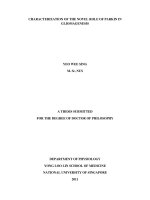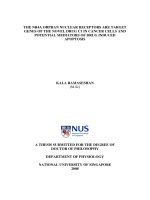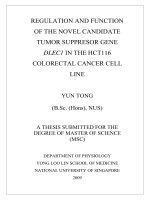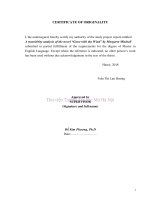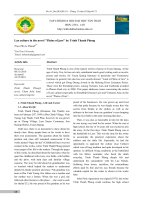the novel smoke
Bạn đang xem bản rút gọn của tài liệu. Xem và tải ngay bản đầy đủ của tài liệu tại đây (723.59 KB, 182 trang )
Smoke
byIvanTurgenev
TranslatedbyConstanceGarnett
London,Heinemann,1897
INTRODUCTIONBY
JOHNREED
INTRODUCTION[byJohnReed,1919]
WHENLitvinovwastornloosefromhis“farfromgayorcomplicated”life,
caughtupinaluridpassioninwhichhewasneverathome,andthenabandoned,
hefleduponthetrain.Atfirsthewasexhaustedbytheprodigiouseffortofwill
hehadmade;thenakindofcomposurecameuponhim.He“washardened.”The
train,theminutes,werecarryinghimawayfromthewreckofhislife.
“Hetooktogazingoutofthewindow.Thedaywasgrayanddamp;therewasno
rain,butthefogheldon,andlowlyingcloudsveiledthesky.Thewindwas
blowinginthecontrarydirectiontothecourseofthetrain;whitishcloudsof
steam,nowalone,nowmingledwithother,darkerclouds,ofsmoke,swept,inan
endlessseries,pastthewindowbesidewhichLitvinovsat.Hebegantowatch
thesteam,thesmoke.Incessantlywhirling,risingandfalling,twistingand
catchingatthegrass,atthebushes,playingpranks,asitwere,lengtheningand
melting,pufffollowedpuff,…theywereconstantlychangingandyetremained
thesame…amonotonous,hurried,tiresomegame!Sometimesthewind
changed,theroadmadeaturn—thewholemasssuddenlydisappeared,and
immediatelybecamevisiblethroughtheoppositewindow;then,oncemore,the
hughtrainflungitselfover,andoncemoreveiledfromLitvinovthewideview
oftheRhineValley.Hegazedandgazed,andastrangereflectionoccurredto
him….Hewasaloneinthecarriage;therewasnoonetointerferewithhim.
‘Smoke,smoke’—herepeatedseveraltimesinsuccession;andsuddenly
everythingappearedtohimtobesmoke—everything,hisownlife,everything
pertainingtomen,especiallyeverythingRussian.Everythingissmokeand
steam,hethought;—everythingseemstobeconstantlyundergoingchange;
everywheretherearenewforms,phenomenonfollowsphenomenon,butin
realityeverythingisexactlyalike;everythingishurrying,hasteningsomewhither
—andeverythingvanisheswithoutleavingatrace,withouthavingattainedto
anyendwhatever;anotherbreezehasbeguntoblow—andeverythinghasbeen
flungtotheotherside,andthere,again,isthesameincessant,agitated—and
uselessgame.Herecalledmanythingswhichhadtakenplace,withmuchsound
andclatter,beforehiseyesthelastfewyears..‘smoke,’hemurmured,
—‘smoke.’”
“Smoke.”ThisisnotonlyLitvinov’sreactionfromexperiencestooterriblefor
hismindandhearttostand—andalsohisconsolation—butitisTurgenev’sown
reactiontolife.Theprofounddisillusionfollowingthefailureofthe
Revolutionarymovementof‘48,whichsweptovertheintellectualsofEurope,
hadalsoitscharacteristicrepercussionamongtheintellectualyouthofRussia,
andmadeagenerationlikethelatergenerationsowellportrayedbyTchekov—
themenofthe’80s,andalsoliketheIntelligentsiaafterthefailureofthe
Revolutionof1905.
Therestlessfutility,self-searching,flabbinessofwillsonativetothistypeare
incarnateinoneofTurgenev’sgreatestcharacters,Rudin.Theypersistin
numerouscharactersinSmoke,andarenotabsentfromthemake-upofLitvinov
himself—norofTurgenev,forthatmatter.Theconceptionofthefutilityof
effort,ofrevolution,ofpoliticalideasingeneral,thetranquillityattainedonlyby
seeinglifefromthestandpointofeternity,Turgenevhadalreadyenunciatedin
FathersandChildren.HewishedtoseelifewithOlympiancalm;theironyof
Basarov’sdeathisakey-noteofhisprofoundpessimism.ButinSmokethereis
bittersatire,showingthatlifetohimwasstillabattle,anexasperation.
TheclaimssooftenmadebycriticsthatTurgenev,thenaturalaristocrat,was
alwaysconsciously,aboveall,anartist,aredisprovedbyhisown
autobiographicalnoteprefacedtothecompleteeditionofhisworkspublishedin
Moscowin1880:
“ItookaheaderintotheGermanOcean,”hesays,speakingofhisgoingto
Berlin,tostudyintheUniversity—where,bytheway,hewasafellow-student
withBakunin.“…Itwasabsolutelynecessaryformetogetclearofmyenemy,
thebettertostrikefromadistance.Tomyeyesthisenemyhadaformidable
appearance,andanordinaryname.Myenemywasthe‘lawfulness’ofSerfdom.”
This“enemy”Turgenevsworetoconquer.“Itwasmy‘Hannibaloath,’andin
thosedaysIwasnottheonlyonewhotookit….IwenttoGermanytoenableme
tofulfillit…”
Howwellhekeptthisoathisevidentintheeffectof“Sportsmen’sSketches,”his
firstimportantbook,publishedabout1852,which,intheguiseofmere
description,depictedthewretchednessofthepeasantsinawaythatroused
Russianpublicopinion,morethananyotheroneinfluence,todemandthe
EmancipationoftheSerfs.ThisbookisoftencalledtheRussian“UncleTom’s
Cabin,”andappearedcontemporaneouslywithit.ThemotiveofEmancipation
runsthroughalmostallTurgenev’swork,andappearsinSmoke,whichwas
publishedafterthefreeingoftheSerfs.(Bytheway,thereisahumorous
referencetoMrs.StoweinChapterIV.)Forinstance,when,bruisedandbroken,
LitvinovreturnstohisestateinRussia,hewasatfirstunabletochangetheold
system:
“Newideaswontheirwaybadly,oldoneshadlosttheirforce;theignorant
clashedwiththedishonest;hiswholederangedexistencewasinconstant
motion,likeaquakingbog,andonlythegreatword‘Liberty’moved,likethe
spiritofGod,overthewaters….
“Butayearpassed,thenasecond,thethirdwasbeginning.Thegrandthought
wasgraduallybeingrealized,wasbeingtransformedintofleshandblood;a
sproutwasputtingforthfromtheseedthathadbeensown;anditsenemies,
eitheropenorsecret,couldnolongertrampleitunderfoot.”
ThetremendousinterestarousedbyTurgenev’sbooksinRussiawaspartlydue
tothefactthattheywereallconcernedwithpolitics—that,besidetheirdelicate
andrestrainedliteraryart,throughthemallranastrainofpropaganda—thatthey
dealtwiththeactualburningquestionsofthetimes.Smoke,inparticular,was
Turgenev’scontributiontothegreatcontroversybetweentheSlavophilsand
thosewhochampionedwesternidealsforRussia.Thereisnodoubtthat
Turgenev’sownidealsareexpressedbytheruinednoblemanPotugin;and
Litvinovhimself,aratherquiet,ordinaryyoungman,whohastraveledover
Europestudyingtechnologyandscientificfarming,isthekindofmanthat
TurgenevpassionatelybelievesRussiatoneed.
Butatthesametimetheauthorhasconcentratedhismostbitterattackupon
thoseRussianyoungmenwhohavecometoEuropeandabsorbed,withalltheir
Slavicfacility,amassofundigestedEuropeanideasandtheories.Thereis
nothinginliteraturemorestingingthanthesatireofthefirstsixchaptersof
Smoke,whichhasaqualityofDickensaboutit.Thisisnothatred,however.
Whilelaughingbitterlyathisyoung“intellectual”countrymen,Turgenev
understandsthem;they,likehimself,arecreaturesofenvironmentandheredity.
Buthepourshiscontemptuponthe“aristocrats”ofSt.Petersburg,whoareonly
cruelandcorrupt.
ThelifeofLitvinovis,initsfundamentals,thelifeofTurgenevhimself.Like
Litvinov,theauthorwasthe“sonofaretiredpettyofficial,”livingonacountry
estate,withamotherwhotriedtoliveasanoble,onaninsufficientincome,
ruiningtheestateintheprocess.AswithLitvinov,nothingbutFrenchwas
spokeninTurgenev’sfamily.TurgenevhimselfhadtolearnRussianfromthe
houseservants—thelanguageofwhichhewasafterwardstobethegreatmaster.
LikeLitvinov,TurgenevalsolivedinBaden.Smokewaswrittenthere,andthe
episodesandcharactersareundoubtedlyfromlife.HecametoBadentobenear
MadameViardot,theoperasinger,hismostintimate,life-longfriend…No
doubt,also,Irinacamefromhisownexperience,atsometime.Sheisoneofa
trio,passionateandbeautiful,wreckersofmen:VarvaraPavlovna,inA
Nobleman’sNest;MariaNikol�vna,inTorrentsofSpring;andIrina.Butsheis
byfartheclearestandmosthumanofthethree.Manymenhaveknownsuch
women—womenwholivelikepanthers,takingwhattheywantandmoving
throughtheworldallbalefulfire,fitmatesonlyforthestrong.AndLitvinovwas
notstrong—norwasTurgenev.
TurgenevwasthenextofthegreatRussiannovelistsinlineafterGogol,the
predecessorandfinallyminorcontemporaryofthegiantsTolstoyand
Dostoyevsky.TheRussianrealisticnovel,developinginitsownwayatechnique
distinctfromthatofWesternliterature,canbepartiallyexplainedbythepolitical
conditionsinRussia.
Politicswereforbidden,andyettheRussianpeoplewerepassionatelyconcerned
withpoliticsandtheRussiannovelistsareaboveallpoliticalpropagandists.Yet
howcouldpoliticsbewrittenaboutsoastobeprintedopenlyandreadin
Russia?OnlybydescribingRussianlifeandinstitutionsintheformofastory,
onlybypaintingapictureofpeopleandpermittingthereadertodrawhisown
conclusions.InthisTurgenevexcelled….
Smoke,outsideoftheonetremendousepisodeofLitvinovandIrinainBaden,is
chieflyinterestingtousasadescriptionofRussiansociety,notonlyinthe‘60,
butevenupto1917.Thissameintelligentsia,absorbingallEuropeanideas,
readingallbooks,adoptingallEuropeantheories,touchedbythesame
instinctivesympathyforWesternliberalism,—andhence,therevolutionary
movementinRussia,—desertedtheRevolutioninapanicwhenitpresented
itselfinallitsuncouthpower.Thissamecorruptandbrutalofficial“aristocracy,”
overthrownwiththeTsar,nownolongerexists,exceptinexile,whereit
intriguesandconspireswithfutilerage,unabletocomprehenditsfate.
InRussiato-daytheSovietGovernmenthaspublishedaneditionofTurgenev’s
works,andthepeoplereadtheminthesamespiritofadmirationforhisliterary
skill,thesamesympathyfortheuniversalqualityofhischaracters,andthesame
historicalinterestastheydoanyfaithfulchroniclerofanageendedforever.
JOHNREED.
SMOKE
THENAMESOFTHECHARACTERSINTHEBOOK
GRIG�RY[Gr�sha]MIH�LOVITCHLITV�NOV.
TAT-Y�NA[T�nya]PETR�VNASHEST�V.
KAPITOL�NAM�RKOVNA.
ROSTISL�VBAMB�EV.
SEMY�NY�KOVLEVITCHVOROSH�LOV.
STEP�NNIKOL�EVITCHGUBAR-Y�V.
MATR�NASEMY�NOVNASUH�NTCHIKOV.
TITBIND�SOV.
PISH-TCH�LKIN.
SOZ�NTIV�NITCHPOT�GIN.
IR�NAP�VLOVNAOS�NIN.
VALERI�NVLAD�MIROVITCHRATM�ROV.
IntranscribingtheRussiannamesintoEnglish—
vowelhasthesoundof….
ahasthesoundofainfather
ehasthesoundofainpane.
ihasthesoundofee
uhasthesoundofoo.
yisalwaysconsonantalexceptwhenitisthelastletteroftheword.
gisalwayshard.
SMOKE
ChapterI
ONthe10thofAugust,1862,atfouro’clockintheafternoon,agreatnumberof
peoplewerethrongingbeforethewell-knownKonversationinBaden-Baden.
Theweatherwaslovely;everythingaround—thegreentrees,thebrighthouses
ofthegaycity,andtheundulatingoutlineofthemountains—everythingwasin
holidaymood,baskingintheraysofthekindlysunshine;everythingseemed
smilingwithasortofblind,confidingdelight;andthesameglad,vaguesmile
strayedoverthehumanfaces,too,oldandyoung,uglyandbeautifulalike.Even
theblackenedandwhitenedvisagesoftheParisiandemi-mondecouldnot
destroythegeneralimpressionofbrightcontentandelation,whiletheirmanycoloredribbonsandfeathersandthesparksofgoldandsteelontheirhatsand
veilsinvoluntarilyrecalledtheintensifiedbrillianceandlightflutteringofbirds
inspring,withtheirrainbow-tintedwings.Butthedry,gutturalsnappingofthe
Frenchjargon,heardonallsidescouldnotequalthesongofbirds,norbe
comparedwithit.
Everything,however,wasgoingoninitsaccustomedway.Theorchestrainthe
PavilionplayedfirstamedleyfromtheTraviata,thenoneofStrauss’swaltzes,
then“Tellher,”aRussiansong,adaptedforinstrumentsbyanobliging
conductor.Inthegamblingsaloons,roundthegreentables,crowdedthesame
familiarfigures,withthesamedull,greedy,half-stupefied,half-exasperated,
whollyrapaciousexpression,whichthegamblingfeverlendstoall,eventhe
mostaristocratic,features.Thesamewell-fedandultra-fashionablydressed
RussianlandownerfromTambovwithwidestaringeyesleanedoverthetable,
andwithuncomprehendinghaste,heedlessofthecoldsmilesofthecroupiers
themselves,attheveryinstantofthecry“riennevaplus,”laidwithperspiring
handgoldenringsoflouisd’oronallthefourcornersoftheroulette,depriving
himselfbysodoingofeverypossibilityofgaininganything,evenincaseof
success.Thisdidnotintheleastpreventhimthesameeveningfromaffirming
thecontrarywithdisinterestedindignationtoPrinceKok�,oneofthewellknownleadersofthearistocraticopposition,thePrinceKok�,whoinParisat
thesalonofthePrincessMathilde,sohappilyremarkedinthepresenceofthe
Emperor:“Madame,leprincipedelapropri�t�estprofond�ment�branl�
enRussie.”AttheRussiantree,�l’arbreRusse,ourdearfellow-countrymen
andcountrywomenwereassembledaftertheirwont.Theyapproachedhaughtily
andcarelesslyinfashionablestyle,greetedeachotherwithdignityandelegant
ease,asbefitsbeingswhofindthemselvesatthetopmostpinnacleof
contemporaryculture.Butwhentheyhadmetandsatdowntogether,theywere
absolutelyatalossforanythingtosaytooneanother,andhadtobecontentwith
apitifulinterchangeofinanities,orwiththeexceedinglyindecentand
exceedinglyinsipidoldjokesofahopelesslystaleFrenchwit,onceajournalist,
achatteringbuffoonwithJewishshoesonhispaltrylittlelegs,anda
contemptiblelittlebeardonhismeanlittlevisage.Heretailedtothem,�ces
princesrusses,allthesweetabsurditiesfromtheoldcomicalmanacsCharivari
andTintamarre,andthey,cesprincesrusses,burstintogratefullaughter,as
thoughforcedinspiteofthemselvestorecognizethecrushingsuperiorityof
foreignwit,andtheirownhopelessincapacitytoinventanythingamusing.Yet
herewerealmostallthe“finefleur”ofoursociety,“allthehigh-lifeandmirrors
offashion.”HerewasCountX.,ourincomparabledilettante,aprofoundly
musicalnature;whosodivinelyrecitessongsonthepiano,butcannot,infact,
taketwonotescorrectlywithoutfumblingatrandomonthekeys,andsingsina
stylesomethingbetweenthatofapoorgypsysingerandaParisianhairdresser.
HerewasourenchantingBaronQ.,amasterineveryline:literature,
administration,oratory,andcard-sharping.Here,too,wasPrinceY.,thefriendof
religionandthepeople,whointheblissfulepochwhenthespirit-tradewasa
monopoly,hadmadehimselfbetimesahugefortunebythesaleofvodka
adulteratedwithbelladonna;andthebrilliantGeneralO.O.,whohadachieved
thesubjugationofsomething,andthepacificationofsomethingelse,andwhois
neverthelessstillanonentity,anddoesnotknowwhattodowithhimself.And
R.R.theamusingfatman,whoregardshimselfasagreatinvalidandagreat
wit,thoughheis,infact,asstrongasabull,andasdullasapost….ThisR.R.is
almosttheonlymaninourdaywhohaspreservedthetraditionsofthedandies
oftheforties,oftheepochofthe“HeroofourTimes,”andtheCountess
Vorotinsky.Hehaspreserved,too,thespecialgaitwiththeswingontheheels,
andlecultedelapose(itcannotevenbeputintowordsinRussian),the
unnaturaldeliberationofmovement,thesleepydignityofexpression,the
immoyable,offended-lookingcountenance,andthehabitofinterruptingother
people’sremarkswithayawn,gazingathisownfinger-nails,laughingthrough
hisnose,suddenlyshiftinghishatfromthebackofhisheadontohiseyebrows,
etc.Here,too,werepeopleingovernmentcircles,diplomats,big-wigswith
Europeannames,menofwisdomandintellect,whoimaginethattheGolden
BullwasanedictofthePope,andthattheEnglishpoor-taxisataxleviedonthe
poor.Andhere,too,werethehot-blooded,thoughtongue-tied,devoteesofthe
damesauxcamellias,youngsocietydandies,withsuperbpartingsdowntheback
oftheirheads,andsplendiddroopingwhiskers,dressedinrealLondon
costumes,youngbuckswhomonewouldfancytherewasnothingtohinderfrom
becomingasvulgarastheillustriousFrenchwitabovementioned.Butno!our
homeproductsarenotinfashionitseems;andCountessS.,thecelebrated
arbitressoffashionandgrandgenre,byspitefultonguesnicknamed“Queenof
theWasps,”and“Medusainamob-cap,”prefers,intheabsenceoftheFrench
wit,toconsortwiththeItalians,Moldavians,Americanspiritualists,smart
secretariesofforeignembassies,andGermansofeffeminate,butprematurely
circumspect,physiognomy,ofwhomtheplaceisfull.Theexampleofthe
CountessisfollowedbythePrincessBabette,sheinwhosearmsChopindied
(theladiesinEuropeinwhosearmsheexpiredaretobereckonedbythousands);
andthePrincessAnnette,whowouldhavebeenperfectlycaptivating,ifthe
simplevillagewasherwomanhadnotsuddenlypeepedoutinherattimes,likea
smellofcabbage,waftedacrossthemostdelicateperfume;andPrincess
Pachette,towhomthefollowingmischancehadoccurred:herhusbandhad
fallenintoagoodberth,andallatonce,Dieusaitpourpuoi,hehadthrashedthe
provostandstolen20,000rublesofpublicmoney;andthelaughingPrincess
Zizi;andthetearfulPrincessZozo.Theyalllefttheircompatriotsononeside,
andweremercilessintheirtreatmentofthem.Letus,too,leavethemonone
side,thesecharmingladies,andwalkawayfromtherenownedtreenearwhich
theysitinsuchcostlybutsomewhattastelesscostumes,andGodgrantthem
relieffromtheboredomconsumingthem!
ChapterII
AFEWpacesfromthe“Russiantree,”atalittletableinfrontofWeber’scoffeehouse,therewassittingagood-lookingman,aboutthirty,ofmediumheight,thin
anddark,withamanlyandpleasantface.Hesatbendingforwardwithbotharms
leaningonhisstick,withthecalmandsimpleairofamantowhomtheideahad
notoccurredthatanyonewouldnoticehimorpayanyattentiontohim.His
largeexpressivegolden-browneyesweregazingdeliberatelyabouthim,
sometimesscreweduptokeepthesunshineoutofthem,andthenwatching
fixedlysomeeccentricfigurethatpassedbyhimwhileachildlikesmilefaintly
stirredhisfinemoustacheandlips,andhisprominentshortchin.Heworea
roomycoatofGermancut,andasoftgrayhathidhalfofhishighforehead.At
thefirstglancehemadetheimpressionofanhonest,sensible,ratherselfconfidentyoungmansuchastherearemanyintheworld.Heseemedtobe
restingfromprolongedlaborsandtobederivingallthemoresimple-minded
amusementfromthescenespreadoutbeforehimbecausehisthoughtswerefar
away,andbecausetheymovedtoo,thosethoughts,inaworldutterlyunlikethat
whichsurroundedhimatthemoment.HewasaRussian;hisnamewasGrigory
MihalovitchLitvinov.
Wehavetomakehisacquaintance,andsoitwillbewelltorelateinafewwords
hispast,whichpresentslittleofmuchinterestorcomplexity.
Hewasthesonofanhonestretiredofficialofplebianextraction,butbewas
educated,notasonewouldnaturallyexpect,inthetown,butinthecountry.His
motherwasofnoblefamily,andhadbeeneducatedinagovernmentschool.She
wasagoodnaturedandveryenthusiasticcreature,notdevoidofcharacter,
however.Thoughshewastwentyyearsyoungerthanherhusband,she
remodelledhim,asfarasshecould,drewhimoutofthepettyofficialgroove
intothelandowner’swayoflife,andsoftenedandrefinedhisharshandstubborn
character.Thankstoher,hebegantodresswithneatness,andtobehavewith
decorum;hecametorespectlearnedmenandlearning,though,ofcourse,he
nevertookasinglebookinhishand;hegaveupswearing,andtriedinevery
waynottodemeanhimself.Heevenarrivedatwalkingmorequietlyand
speakinginasubduedvoice,mostlyofelevatedsubjects,whichcosthimno
smalleffort.“Ah!theyoughttobeflogged,andthat’sallaboutit!”he
sometimesthoughttohimself,butaloudhepronounced:“Yes,yes,that’sso…of
course;itisagreatquestion.”Litvinov’smothersetherhousehold,too,upona
Europeanfooting;sheaddressedtheservantsby‘theplural“you”insteadofthe
familiar“thou,”andneverallowedanyonetogorgehimselfintoastateof
lethargyathertable.Asregardsthepropertybelongingtoher,neithershenor
herhusbandwascapableoflookingafteritatall.Ithadbeenlongallowedtorun
towaste,buttherewasplentyofland,withallsortsofusefulappurtenances,
forest-landsandalake,onwhichtherehadoncestoodafactory,whichhadbeen
foundedbyazealousbutunsystematicowner,andhadflourishedinthehandsof
ascoundrellymerchant,andgoneutterlytoruinunderthesuperintendenceofa
conscientiousGermanmanager.MadameLitvinovwascontentedsolongasshe
didnotdissipateherfortuneorcontractdebts.Unluckilyshecouldnotboastof
goodhealth,andshediedofconsumptionintheveryyearthathersonentered
theMoscowuniversity.Hedidnotcompletehiscoursethereowingto
circumstancesofwhichthereaderwillhearmorelateron,andwentbacktohis
provincialhome,whereheidledawaysometimewithoutworkandwithoutties,
almostwithoutacquaintances.Thankstothedisinclinationforactiveserviceof
thelocalgentry,whowere,however,notsomuchpenetratedbytheWestern
theoryoftheevilsof“absenteeism,”asbythehome-grownconvictionthat
“one’sownshirtisthenearesttoone’sskin,”hewasdrawnformilitaryservice
in1855,andalmostdiedoftyphusintheCrimea,wherehespentsixmonthsina
mud-hutontheshoreofthePutridSea,withouteverseeingasingleally.After
that,heserved,notofcoursewithoutunpleasantexperiences,onthecouncilsof
thenobility,andafterbeingalittletimeinthecountry,acquiredapassionfor
farming.Herealizedthathismother’sproperty,undertheindolentandfeeble
managementofhisinfirmoldfather,didnotyieldatenthoftherevenueitmight
yield,andthatinexperiencedandskillfulhandsitmightbeconvertedintoa
perfectgoldmine.Butherealized,too,thatexperienceandskillwerejustwhat
helacked—andhewentabroadtostudyagricultureandtechnology—tolearn
themfromthefirstrudiments.Morethanfouryearshehadspentin
Mecklenburg,inSilesia,andinCarlsruhe,andhehadtraveledinBelgiumandin
England.Hehadworkedconscientiouslyandaccumulatedinformation;hehad
notacquirediteasily;buthehadperseveredthroughhisdifficultiestotheend,
andnowwithconfidenceinhimself,inhisfuture,andinhisusefulnesstohis
neighbors,perhapseventothewholecountryside,hewaspreparingtoreturn
home,wherehewassummonedwithdespairingprayersandentreatiesinevery
letterfromhisfather,nowcompletelybewilderedbytheemancipation,the
redivisionoflands,andthetermsofredemption—bythenewr�gimeinshort.
ButwhywasheinBaden?
Well,hewasinBadenbecausehewasfromdaytodayexpectingthearrival
thereofhiscousinandbetrothed,TatyanaPetrovnaShestov.Hehadknownher
almostfromchildhood,andhadspentthespringandsummerwithherat
Dresden,whereshewaslivingwithheraunt.Hefeltsincereloveandprofound
respectforhisyoungkinswoman,andontheconclusionofhisdullpreparatory
labors,whenhewaspreparingtoenteronanewfield,tobeginreal,unofficial
duties,heproposedtoherasawomandearlyloved,acomradeandafriend,to
uniteherlifewithhis—forhappinessandforsorrow,forlaborandforrest,“for
better,forworse”astheEnglishsay.Shehadconsented,andhehadreturnedto
Carlsruhe,wherehisbooks,papersandpropertieshadbeenleft.
ButwhywasheatBaden,youaskagain?
Well,hewasatBaden,becauseTatyana’saunt,whohadbroughtherup,
KapitolinaMarkovnaShestov,anoldunmarriedladyoffifty-five,amost
goodnatured,honest,eccentricsoul,afreethinker,allaglowwiththefireofselfsacrificeandabnegation,anespritfort(shereadStrauss,itistruesheconcealed
thefactfromherniece)andademocrat,swornopponentofaristocracyand
fashionablesociety,couldnotresistthetemptationofgazingforonceonthis
aristocraticsocietyinsuchafashionableplaceasBaden….Kapitolina
Markovnaworenocrinolineandhadherwhitehaircutinaroundcrop,but
luxuryandsplendorhadasecretfascinationforher,anditwasherfavorite
pastimetorailatthemandexpresshercontemptofthem.Howcouldonerefuse
togratifythegoodoldlady?ButLitvinovwassoquietandsimple,hegazedso
self-confidentlyabouthim,becausehislifelaysoclearlymappedoutbefore
him,becausehiscareerwasdefined,andbecausehewasproudofthiscareer,
andrejoicedinitastheworkofhisownhands.
ChapterIII
“HULLO!hullo!hereheis!”hesuddenlyheardasqueakyvoicejustabovehis
ear,andaplumphandslappedhimontheshoulder.Heliftedhishead,and
perceivedoneofhisfewMoscowacquaintances,acertainBambaev,a
goodnaturedbutgood-for-nothingfellow.Hewasnolongeryoung,hehada
flabbynoseandsoftcheeks,thatlookedasiftheyhadbeenboiled,dishevelled
greasylocks,andafatsquatperson.Everlastinglyshortofcash,and
everlastinglyinrapturesoversomething,RostislavBambaevwandered,aimless
butexclamatory,overthefaceofourlong-sufferingmother-earth.“Well,thisis
somethinglikeameeting!”herepeated,openingwidehissunkeneyes,and
drawingdownhisthicklips,overwhichthestragglingdyedmoustachesseemed
strangelyoutofplace.“Ah,Baden!Alltheworldrunsherelikeblack-beetles!
Howdidyoucomehere,Grisha?”
TherewaspositivelynooneintheworldBambaevdidnotaddressbyhis
Christianname.
“Icameherethreedaysago.”
“Fromwhere?”
“Whydoyouask?”
“Whyindeed?Butstop,stopaminute,Grisha.Youare,perhaps,notawarewho
hasjustarrivedhere!Gubaryovhimself,inperson!That’swho’shere!Hecame
yesterdayfromHeidelberg.Youknowhimofcourse?”
“Ihaveheardofhim.”
“Isthatall?Uponmyword!Atonce,thisveryminutewewillhaulyoualongto
him.Notknowamanlikethat!Andbythewayhere’sVoroshilov….Stopa
minute,Grisha,perhapsyoudon’tknowhimeither?Ihavethehonortopresent
youtooneanother.Bothlearnedmen!He’saphoenix,indeed!Kisseachother!”
Andutteringthesewords,Bambaevturnedtoagood-lookingyoungman
standingnearhimwithafreshandrosy,butprematurelydemureface.Litvinov
gotup,and,itneedhardlybesaid,didnotkisshim,butexchangedacursory
bowwiththephoenix,who,tojudgefromtheseverityofhisdemeanor,wasnot
overpleasedatthisunexpectedintroduction.
“Isaidaphoenix,andIwillnotgobackfrommyword,”continuedBambaev;
“gotoPetersburg,tothemilitaryschool,andlookatthegoldenboard;whose
namestandsfirstthere?ThenameofVoroshilov,SemyonYakovlevitch!But,
Gubaryov,Gubaryov,mydearfellow!It’stohimwemustfly!Iabsolutely
worshipthatman!AndI’mnotalone,everyone’sathisfeet!Ah,whatawork
heiswriting,O—O—O!….”
“Whatishisworkabout?”inquiredLitvinov.
“Abouteverything,mydearboy,afterthestyleofBuckle,youknow…butmore
profound,moreprofound….Everythingwillbesolvedandmadeclearinit?”
“Andhaveyoureadthisworkyourself?”
“No,Ihavenotreadit,andindeedit’sasecret,whichmustnotbespreadabout;
butfromGubaryovonemayexpecteverything,everything!Yes!”Bambaev
sighedandclaspedhishands.“Ah,ifwehadtwoorthreeintellectslikethat
growingupinRussia,ah,whatmightn’tweseethen,myGod!Itellyouone
thing,Grisha;whateverpursuityoumayhavebeenengagedinintheselatter
days—andIdon’tevenknowwhatyourpursuitsareingeneral—whateveryour
convictionsmaybe—Idon’tknowthemeither—fromhim,Gubaryov,youwill
findsomethingtolearn.Unluckily,heisnothereforlong.Wemustmakethe
mostofhim,wemustgo.Tohim,tohim!”
Apassingdandywithreddishcurlsandablueribbononhislowhat,turned
roundandstaredthroughhiseyeglasswithasarcasticsmileatBambaev.
Litvinovfeltirritated.
“Whatareyoushoutingfor?”hesaid;“onewouldthinkyouwerehallooingdogs
onatahunt!Ihavenothaddinneryet.”
“Well,thinkofthat!wecangoatoncetoWeber’s…thethreeofus…capital!
Youhavethecashtopayforme?”headdedinanundertone.
“Yes,yes;only,Ireallydon’tknow—”
“Leaveoff,please;youwillthankmeforit,andhewillbedelighted.Ah,
heavens!”Bambaevinterruptedhimself.“It’sthefinalefromErnanithey’re
playing.Howdelicious!…Asom…moCarlo….WhatafellowIam,though!In
tearsinaminute.Well,SemyonYakovlevitch!Voroshilov!shallwego,eh?”
Voroshilov,whohadremainedallthewhilestandingwithimmovablepropriety,
stillmaintaininghisformerhaughtydignityofdemeanor,droppedhiseyes
expressively,frowned,andmutteredsomethingbetweenhisteeth…buthedid
notrefuse;andLitvinovthought,“Well,wemayaswelldoit,asI’veplentyof
timeonmyhands.”Bambaevtookhisarm,butbeforeturningtowardsthecaf�
hebeckonedtoIsabelletherenownedflower-girloftheJockeyClub:hehad
conceivedtheideaofbuyingabunchofflowersofher.Butthearistocratic
flower-girldidnotstir;and,indeed,whatshouldinducehertoapproacha
gentlemanwithoutgloves,inasoiledfustianjacket,streakycravat,andboots
troddendownatheel,whomshehadnotevenseeninParis?ThenVoroshilovin
histurnbeckonedtoher.Tohimsheresponded,andhe,takingatinybunchof
violetsfromherbasket,flungheraflorin.Hethoughttoastonishherbyhis
munificence,butnotaneyelashonherfacequivered,andwhenhehadturned
away,shepurseduphermouthcontemptuously.Voroshilovwasdressedvery
fashionably,evenexquisitely,buttheexperiencedeyeoftheParisiangirlnoted
atonceinhisget-upandinhisbearing,inhisverywalk,whichshowedtracesof
prematuremilitarydrill,theabsenceofgenuine,pure-blooded“chic.”
Whentheyhadtakentheirseatsintheprincipaldining-hallatWeber’s,and
ordereddinner,ourfriendsfellintoconversation.Bambaevdiscoursedloudly
and,hotlyupontheimmenseimportanceofGubaryov,butsoonheceased
speaking,and,gaspingandchewingnoisily,drainedoffglassafterglass.
Voroshilovateanddranklittle,andasitwerereluctantly,andafterquestioning
Litvinovastothenatureofhisinterests,felltogivingexpressiontohisown
opinions—notsomuchonthoseinterests,asonquestionsofvariouskindsin
general….Allatoncehewarmedup,andsetoffatagalloplikeaspiritedhorse,
boldlyanddecisivelyassigningtoeverysyllable,everyletter,itsdueweight,
likeaconfidentcadetgoingupforhis“final”examination,withvehement,but
inappropriategestures.Ateveryinstant,sincenooneinterruptedhim,he
becamemoreeloquent,moreemphatic;itseemedasthoughhewerereadinga
dissertationorlecture.Thenamesofthemostrecentscientificauthorities—with
theadditionofthedatesofthebirthordeathofeachofthem—thetitlesof
pamphletsthathadonlyjustappeared,andnames,names,names…fellin
showerstogetherfromhistongue,affordinghimselfintensesatisfaction,
reflectedinhisglowingeyes.Voroshilov,seemingly,despisedeverythingold,
andattachedvalueonlytothecreamofculture,thelatest,mostadvancedpoints
ofscience;tomention,howeverinappropriately,abookofsomeDoctor
ZauerbengelonPennsylvanianprisons,oryesterday’sarticlesintheAsiatic
JournalontheVedasandPuranas(hepronounceditJournalintheEnglish
fashion,thoughhecertainlydidnotknowEnglish)wasforhimarealjoy,a
felicity.Litvinovlistenedandlistenedtohim,andcouldnotmakeoutwhatcould
behisspecialline.AtonemomenthistalkwasofthepartplayedbytheCeltic
raceinhistory;thenhewascarriedawaytotheancientworld,anddiscoursed
uponthe�ginetanmarbles,haranguedwithgreatwarmthonthesculptorliving
earlierthanPhidias,Onetas,whowas,however,transformedbyhiminto
Jonathan,whichlenthiswholediscourseahalf-Biblical,half-Americanflavor;
thenhesuddenlyboundedawaytopoliticaleconomyandcalledBastiatafoolor
ablockhead,“asbadasAdamSmithandallthephysiocrats.”“Physiocrats,”
murmuredBambaevafterhim…“aristocrats?”AmongotherthingsVoroshilov
calledforthanexpressionofbewildermentonBambaev’sfacebycriticism,
droppedcasuallyinpassing,ofMacaulay,asanold-fashionedwriter,superseded
bymodemhistoricalscience;asforGneist,hedeclaredheneedscarcelyreferto
him,andheshruggedhisshoulders.Bambaevshruggedhisshoulderstoo.“And
allthisatonce,withoutanyinducement,beforestrangers,inacaf�”—Litvinov
reflected,lookingatthefairhair,cleareyes,andwhiteteethofhisnew
acquaintance(hewasspeciallyembarrassedbythoselargesugar-whiteteeth,
andthosehandswiththeirinappropriategesticulations),“andhedoesn’tonce
smile;andwithitall,hewouldseemtobeanicelad,andabsolutely
inexperienced.”Voroshilovbegantocalmdownatlast,hisvoice,youthfully
resonantandshrillasayoungcock’s,brokealittle…Bambaevseizedthe
opportunitytodeclaimversesandagainnearlyburstintotears,which
scandalizedonetablenearthem,roundwhichwasseatedanEnglishfamily,and
setanothertittering;twoParisiancocotteswerediningatthissecondtablewitha
creaturewhoresembledanancientbabyinawig.Thewaiterbroughtthebill;
thefriendspaidit.
“Well,”criedBambaev,gettingheavilyupfromhischair,“nowforacupof
coffee,andquickmarch.Theresheis,’ourRussia,”headded,stoppinginthe
doorway,andpointingalmostrapturouslywithhissoftredhandtoVoroshilov
andLitvinov…“Whatdoyouthinkofher?…”
“Russia,indeed,”thoughtLitvinov;andVoroshilov,whosefacehadbynow
regaineditsconcentratedexpression,againsmiledcondescendingly,andgavea
littletapwithhisheels.
Withinfiveminutestheywereallthreemountingthestairsofthehotelwhere
StepanNikolaitchGubaryovwasstaying….Atailslenderlady,inahatwitha
shortblackveil,wascomingquicklydownthesamestaircase.Catchingsightof
Litvinovsheturnedsuddenlyroundtohim,andstoppedstillasthoughstruckby
amazement.Her’faceflushedinstantaneously,andthenasquicklygrewpale
underitsthicklaceveil;butLitvinovdidnotobserveher,andthelady,randown
thewidestepsmorequicklythanbefore.
ChapterIV
“GRIGORYLITVINOV,abrick,atrueRussianheart.Icommendhimtoyou,”
criedBambaev,conductingLitvinovuptoashortmanofthefigureofacountry
gentleman,withanunbuttonedcollar,inashortjacket,graymorningtrousers
andslippers,standinginthemiddleofalight,andverywell-furnishedroom;
“andthis,”headded,addressinghimselftoLitvinov,“ishe,themanhimself,do
youunderstand?Gubaryov,then,inaword.”Litvinovstaredwithcuriosityat
“themanhimself.”Hedidnotatfirstsightfindinhimanythingoutofthe
common.Hesawbeforehimagentlemanofrespectable,somewhatdullexterior,
withabroadforehead,largeeyes,fulllips,abigbeard,andathickneck,witha
fixedgaze,bentsidelonganddownwards.Thisgentlemansimpered,andsaid,
“Mmm…ah…verypleased,…”raisedhishandtohisownface,andatonce
turninghisbackonLitvinov,tookafewpacesuponthecarpet,withaslowand
peculiarshuffle,asthoughheweretryingtoslinkalongunseen.Gubaryovhad
thehabitofcontinuallywalkingupanddown,andconstantlypluckingand
combinghisbeardwiththetipsofhislonghardnails.BesidesGubaryov,there
wasalsointheroomaladyofaboutfifty,inashabbysilkdress,withan
excessivelymobilefacealmostasyellowasalemon,alittleblackmoustacheon
herupperlip,andeyeswhichmovedsoquicklythattheyseemedasthoughthey
werejumpingoutofherhead;therewastooabroad-shoulderedmansittingbent
upinacorner.
“Well,honoredMatronaSemyonovna,”beganGubaryov,turningtothelady,and
apparentlynotconsideringitnecessarytointroduceLitvinovtoher,“whatwasit
youwerebeginningtotellus?”
Thelady(hernamewasMatronaSemyonovnaSuhantchikov—shewasawidow,
childless,andnotrich,andhadbeentravelingfromcountrytocountryfortwo
yearspast)beganwithpeculiarexasperatedvehemence:
“Well,soheappearsbeforetheprinceandsaystohim:‘YourExcellency,’he
says,‘insuchanofficeandsuchapositionasyours,whatwillitcostyouto
alleviatemylot?You,’hesays,‘cannotbutrespectthepurityofmyideas!And
isitpossible,’hesays,‘inthesedaystopersecuteamanforhisideas?’Andwhat
doyousupposetheprincedid,thatcultivateddignitaryinthatexaltedposition?”
“Why,whatdidhedo?”observedGubaryov,lightingacigarettewitha
meditativeair.
Theladydrewherselfupandheldoutherbonyrighthand,withthefirstfinger
separatedfromtherest.
“Hecalledhisgroomandsaidtohim,‘Takeoffthatman’scoatatonce,and
keepityourself.Imakeyouapresentofthatcoat!’”
“Anddidthegroomtakeit?”askedBambaev,throwinguphisarms.
“Hetookitandkeptit.AndthatwasdonebyPrinceBarnaulov,thewell-known
richgrandee,investedwithspecialpowers,therepresentativeofthegovernment.
Whatisonetoexpectafterthat!”
ThewholefrailpersonofMadameSuhantchikovwasshakingwithindignation,
spasmspassedoverherface,herwitheredbosomwasheavingconvulsively
underherflatcorset;ofhereyesitisneedlesstospeak,theywerefairlyleaping
outofherhead.Butthentheywerealwaysleaping,whatevershemightbe
talkingabout.
“Acryingshame,acryingshame!”criedBambaev.“Nopunishmentcouldbe
badenough!”
“Mmm….Mmm….Fromtoptobottomit’sallrotten,”observedGubaryov,
withoutraisinghisvoice,however.Inthatcasepunishmentisnot…thatneeds…
othermeasures.”
“Butisitreallytrue?”commentedLitvinov.
“Isittrue?”brokeinMadameSuhantchikov.“Why,thatonecan’tevendreamof
doubting…can’tevend—d—d—reamofit.”Shepronouncedthesewordswith
suchenergythatshewasfairlyshakingwiththeeffort.“Iwastoldofthatbya
verytrustworthyman.Andyou,StepanNikolaitch,knowhim—Elistratov,
Kapiton.Heheardithimselffromeyewitnesses,spectatorsofthisdisgraceful
scene.”
“WhatElistratov?”inquiredGubaryov.“TheonewhowasinKazan?”
“Yes.Iknow,StepanNikolaitch,arumorwasspreadabouthimthathetook
bribestherefromsomecontractorsordistillers.Butthenwhoisitsaysso?
Pelikanov!AndhowcanonebelievePelikanovwheneveryoneknowsheis
simply—aspy!”
“No,withyourpermission,MatronaSemyonovna,”interposedBambaev,“Iam
friendswithPelikanov,heisnotaspyatall.”
“Yes,yes,that’sjustwhatheis,aspy!”
“Butwaitaminute,kindly—”
“Aspy,aspy!”shriekedMadameSuhantchikov.
“No,no,oneminute,Itellyouwhat,”shriekedBambaevinhisturn.
“Aspy,aspy,”persistedMadameSuhantchikov.
“No,no!There’sTentelyevnow,that’sadifferentmatter,”roaredBambaevwith
alltheforceofhislungs.
MadameSuhantchikovwassilentforamoment.“Iknowforafactaboutthat
gentleman,”hecontinuedinhisordinaryvoice,“thatwhenhewassummoned
beforethesecretpolice,hegroveledatthefeetoftheCountessBlazenkrampff
andkeptwhining,‘Saveme,intercedeforme!’ButPelikanovneverdemeaned
‘himselftobasenesslikethat.”
“Mm…..Tentelyev…”mutteredGubaryov,“that…thatoughttobenoted.”
MadameSuhantchikovshruggedhershoulderscontemptuously.
“They’reoneworsethananother,”shesaid,“butIknowastillbetterstoryabout
Tentelyev.Hewas,aseveryoneknows,amosthorribledespotwithhisserfs,
thoughhegavehimselfoutforanemancipator.Well,hewasonceatsome
friend’shouseinParis,andsuddenlyincomesMadameBeecherStowe—you
know,UncleTom’sCabin.Tentelyev,who’sanawfullypushingfellow,began
askingthehosttopresenthim;butdirectlysheheardhisname.‘What?’shesaid,
‘hepresumestobeintroducedtotheauthorofUncleTom?’Andshegavehima
slaponthecheek!‘Goaway!’shesays,‘atonce!’Andwhatdoyouthink?
Tentelyevtookhishatandslunkaway,prettycrestfallen.”“Come,Ithinkthat’s
exaggerated,”observedBambaev.“‘Goaway’shecertainlydidsay,that’safact,
butshedidn’tgivehimasmack!”
“Shedid,shedid!”repeatedMadameSuhantchikovwithconvulsiveintensity:“I
amnottalkingidlegossip.Andyouarefriendswithmenlikethat!”
“Excuseme,excuseme,MatronaSemyonovna,IneverspokeofTentelyevasa
friendofmine;IwasspeakingofPelikanov.”
“Well,ifit’snotTentelyev,it’sanother.Mihnyov,forexample.”
“Whatdidhedothen?”askedBambaev,alreadyshowingsignsofalarm.“What?
Isitpossibleyoudon’tknow?HeexclaimedonthePoznesenskyProspectinthe
hearingofalltheworldthatalltheliberalsoughttobeinprison;andwhat’s
more,anoldschoolfellowcametohim,apoormanofcourse,andsaid,‘CanI
come.todinnerwithyou?’Andthiswashisanswer.‘No,impossible;Ihavetwo
countsdiningwithmeto-day…getalongwithyou!’”
“Butthat’sslander,uponmyword!”vociferatedBambaev.
“Slander?…slander?Inthefirstplace,PrinceVahrushkin,whowasalsodining
atyourMihnyov’s–-”“PrinceVahrushkin,”Gubaryovinterpolatedseverely,“is
mycousin;butIdon’tallowhimtoentermyhouse….Sothereisnoneedto
mentionhim,even.”“Inthesecondplace,”continuedMadameSuhantchikov,
withasubmissivenodinGubaryov’sdirection,“PraskovyaYakovlevnatoldme
soherself.”
“Youhavehitonafineauthoritytoquote!Why,sheandSarkizovarethe
greatestscandal-mongersgoing.”
“Ibegyourpardon,Sarkizovisaliar,certainly.Hefilchedtheverypallof
brocadeoffhisdeadfather’scoffin.Iwillneverdisputethat;butPraskovya
Yakovlovna—there’snocomparison!Rememberhowmagnanimouslyshe
partedfromherhusband!Butyou,Iknow,arealwaysready—”
“Come,enough,enough,MatronaSemyonovna,saidBambaev,interruptingher,
“letusgiveupthistittletattle,andtakealoftierflight.Iamnotnewtothework,
youknow.HaveyoureadMlle.delaQuintinie?That’ssomethingcharming
now!Andquiteinaccordwithyourprinciplesatthesametime!”“Ineverread
novelsnow,”wasMadameSuhantchikov’sdryandsharpreply.
“Why?”
“BecauseIhavenotthetimenow;Ihavenothoughtsnowbutforonething,
sewingmachines.”
“Whatmachines?”inquiredLitvinov.“Sewing,sewing;allwomenoughtto
providethemselveswithsewing-machines,andformsocieties;inthatwaythey
willallbeenabledtoearntheirliving,andwillbecomeindependentatonce.In
nootherwaycantheyeverbeemancipated.Thatisanimportant,mostimportant
socialquestion.IhadsuchanargumentaboutitwithBoleslavStadnitsky.
BoleslavStadnitskyisamarvelousnature,buthelooksatthesethingsinan
awfullyfrivolousspirit.Hedoesnothingbutlaugh.Idiot!”
“Allwillintheirduetimebecalledtoaccount,fromallitwillbeexacted,”
pronouncedGubaryovdeliberately,inatonehalf-professorial,half-prophetic.
“Yes,yes,”repeatedBambaev,“itwillbeexacted,preciselyso,itwillbe
exacted.But,StepanNikolaitch,”headded,droppinghisvoice,“howgoesthe
greatwork?”“Iamcollectingmaterials,”repliedGubaryov,knittinghisbrows;
and,turningtoLitvinov,whoseheadbegantoswimfromthemedleyof
unfamiliarnames,andthefrenzyofbackbiting,heaskedhimwhatsubjectshe
wasinterestedin.
Litvinovsatisfiedhiscuriosity.“Ah!tobesure,thenaturalsciences.Thatis
useful,astraining;astraining,notasanendinitself.Theendatpresentshould
be…mm….shouldbe…different.Allowmetoaskwhatviewsdoyouhold?”
“Whatviews?”
“Yes,thatis,moreaccuratelyspeaking,whatareyourpoliticalviews?”
Litvinovsmiled.
“Strictlyspeaking,Ihavenopoliticalviews.”
Thebroad-shoulderedmansittinginthecornerraisedhisheadquicklyatthese
wordsandlookedattentivelyatLitvinov.
“Howisthat?”observedGubaryovwithpeculiargentleness.“Haveyounotyet
reflectedonthesubject,orhaveyougrownwearyofit?”
“HowshallIsay?ItseemstomethatforusRussians,itistooearlyyettohave
politicalviewsortoimaginethatwehavethem.ObservethatIattributetothe
word‘political’themeaningwhichbelongstoitbyright,andthat—”
“Aha!hebelongstotheundeveloped,”Gubaryovinterruptedhim,withthesame
gentleness,andgoinguptoVoroshilov,heaskedhim:‘Hadhereadthepamphlet
hehadgivenhim?’Voroshilov,toLitvinov’sastonishment,hadnotuttereda
wordeversincehisentrance,buthadonlyknittedhisbrowsandrolledhiseyes
(asarulehewaseitherspeechifyingorelseperfectlydumb).Heflowexpanded
hischestinsoldierlyfashion,andwithatapofhisheels,noddedassent.
“Well,andhowwasit?Didyoulikeit?”
“Asregardsthefundamentalprinciples,Ilikedit;butIdidnotagreewiththe
inferences.”“Mmm….AndreiIvanitchpraisedthatpamphlet,however.You
mustexpandyourdoubtstomelater.”
“Youdesireitinwriting?”Gubaryovwasobviouslysurprised;hehadnot
expectedthis;however,afteramoment’sthought,hereplied:
“Yes,inwriting.Bytheway,Iwillaskyoutoexplaintomeyourviewsalso…
inregardto…inregardtoassociations.”
“AssociationsonLassalle’ssystem,doyoudesire,oronthesystemofSchulzeDelitzsch?”“Mmm….onboth.ForusRussians,youunderstand,thefinancial
aspectofthematterisspeciallyimportant.Yes,andtheartel…asthegerm…
Allthat,onemusttakenoteof.Onemustgodeeplyintoit.Andthequestion,
too,ofthelandtobeapportionedtothepeasants….”
“Andyou,StepanNikolaitch,whatisyourviewastothenumberofacres
suitable?”inquiredVoroshilov,withreverentialdelicacyinhisvoice.“Mmm….
andthecommune?”articulatedGubaryov,deepinthought,andbitingatuftof
hisbeardhestaredatthetable-leg.“Thecommune!…DoYouunderstand?That
isagrandword’!Thenwhatisthesignificanceoftheseconflagrations?these…
thesegovernmentmeasuresagainstSunday-schools,reading-rooms,journals?
Andtherefusalofthepeasantstosignthechartersregulatingtheirpositionin
thefuture?Andfinally,whatofwhatishappeninginPoland?Don’tyousee
that…mmm…thatwe…wehavetounitewiththepeople…findout…findout
theirviews—”Suddenlyaheavy,almostawrathfulemotionseemedtotake
possessionofGubaryov;heevengrewblackinthefaceandbreathedheavily,
butstilldidnotraisehiseyes,andcontinuedtognawathisbeard.“Can’tyou
see—”
“Yevseyevisawretch!”MadameSuhantchikovburstoutnoisilyallofasudden.


